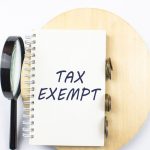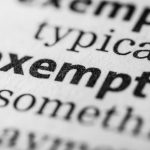Churches and charities that receive tax-deductible charitable contributions are subject to federal tax laws. In particular, the Internal Revenue Code (IRC) requires that donors obtain specific written acknowledgment of some charitable contributions as a prerequisite for claiming a deduction on their federal tax returns. As a result, churches and charities must familiarize themselves with these requirements and ensure they are in full compliance, so they do not run afoul of federal tax laws. For more information about how federal tax laws apply to your church or charitable organization, contact Church Law Center at (949) 892-1221 today.
Understanding the Obligation of Donors to Obtain Written Acknowledgment of Charitable Contributions
IRS Publication 1771, Charitable Contributions-Substantiation and Disclosure Requirements, explains in detail the obligations of donors wishing to claim charitable contributions deductions on their federal tax returns. One of the requirements is that donors must obtain a written acknowledgment from a charity for any contribution of $250 or more before they can claim it on their federal income tax returns. Donors do not attach the written acknowledgment to their tax returns but must retain the acknowledgment for their records.
Although the organization incurs no penalty for failing to provide the required written acknowledgment, the donor cannot claim the donation as a tax deduction without the acknowledgment. This situation may deter donors from contributing to this particular charity or church in the future. Therefore, charitable organizations have a strong inducement to provide donors with the necessary written acknowledgment to enable their donors to claim the donations as tax-deductible.
Requirements for the Written Acknowledgment of Charitable Contribution
The acknowledgment of a donation to a charitable organization must be in writing and contain the following information:
- the name of the organization;
- the amount of cash contribution;
- a description (but not the value) of non-cash contribution;
- a statement that the organization provided no goods or services in return for the contribution if that was the case; and
- a description and good faith estimate of the value of goods or services that an organization provided in return for the contribution.
The written acknowledgment also must contain a statement that goods or services, if any, that an organization provided in return for the contribution consisted entirely of intangible religious benefits if that was the case. According to IRS Publication 1771, intangible religious benefits are “benefits provided by a tax-exempt organization operated exclusively for religious purposes . . . not usually sold in commercial transactions outside a donative (gift) context.”
Many churches and charities wish to go further in their written acknowledgment and include a statement that donations are tax-deductible. However, the IRC does not require a written acknowledgment to contain any statement about the tax-deductible nature of contributions. Furthermore, as the rules on tax deductions for charitable contributions are extremely complex, we generally recommend that churches and charities NOT give tax advice to donors on their receipts and acknowledgments. Typically, charitable organizations have insufficient information about specific donors to give tax advice about deductibility. Instead, we advise charitable organizations to include a generic statement, such as “Charity Name is a tax-exempt charity under §501(c)(3) of the Internal Revenue Code (IRC). Charitable contributions to charities are tax-deductible to the donor under the terms of IRC §170.”
A church or charity may issue a separate written acknowledgment for every contribution of $250 or more or a single acknowledgment, such as an annual summary, to substantiate more than one contribution of $250. The IRS provides no specific form the church or charity must use for the acknowledgment. The charitable organization may provide the written acknowledgment in paper format or electronically.
The written acknowledgment also must be contemporaneous with the time of the donation. As a practical matter, most churches and charities provide written acknowledgment to donors no later than January 31st of the year following the donation. For the IRS to consider the acknowledgment to be contemporaneous, the donor must receive the acknowledgment by the earlier of:
- the date on which the donor files their federal income tax return for the year of the contribution; or
- the due date (including extensions) of the return.
Provision of Goods and Services in Exchange for Donations
Suppose the church or charity provides goods or services to the donor in exchange for $250 or more in donations. In that case, it must provide the donor with a written acknowledgment of the donation, including a good faith estimate of the value of the goods and services. This estimate is necessary because the donor typically must reduce the amount of the contribution deduction by the fair market value of the goods or services provided by the charity. Goods and services may include any of the following:
- Cash
- Property
- Services
- Benefits
- Privileges
However, IRS regulations do provide for some exceptions. For instance, charitable organizations do not have to provide token or insubstantial goods or services in their written acknowledgments. In addition, other exceptions exist for annual recurring membership rights or benefits for donations of $75 or less and intangible religious benefits.
Likewise, if a donor makes a payment to a charity that is more than $75 that is partially a donation and partially for goods and services provided by the charity, then the charity also must provide a written disclosure statement. Again, the charity must provide a written estimate of the value of the goods and services provided because the donor can only take a contribution deduction to the extent that their contribution exceeds the fair market value of the goods or services received in return. In this instance, the required disclosure statement must:
- inform a donor that the amount of the contribution that is deductible for federal income tax purposes is limited to the excess of money (and the fair market value of property other than money) contributed by the donor over the value of goods or services provided by the organization; and
- provide a donor with a good-faith estimate of the fair market value of the goods or services.
Donations of $250 or More in the Form of Unreimbursed Expenses
A charitable organization must provide a further written acknowledgment to a donor who provides a single contribution of $250 or more in the form of unreimbursed expenses. An example of this contribution includes out-of-pocket transportation expenses to perform volunteer work for the organization. In this situation, the written acknowledgment must contain the following:
- description of the services provided by the donor;
- statement of whether the organization provided goods or services in return for the contribution;
- description and good faith estimate of the value of goods or services, if any, that the organization provided in return for the contribution; and
- a statement that the goods or services the organization provided in return for the contribution consisted entirely of intangible religious benefits if that was the case.
Contact Us Today for Legal Assistance
Church Law Center gears its practice to legal matters that affect nonprofit organizations, churches, and other religious organizations, including nonprofit political activity in California. This focus allows us to concentrate on keeping abreast of the ever-changing laws and policies as they develop over time. We are here to represent your interests throughout every stage of your legal matter. Call us today at (949) 892-1221, or visit us online and see what we can do for you.






